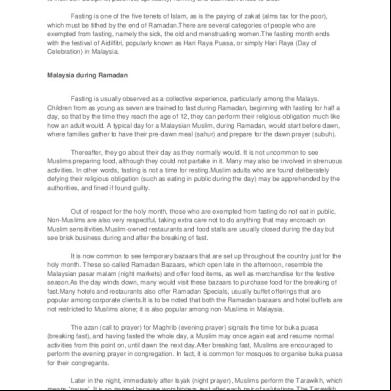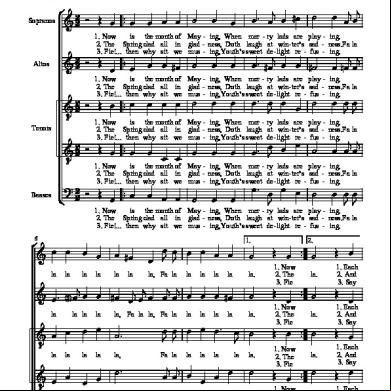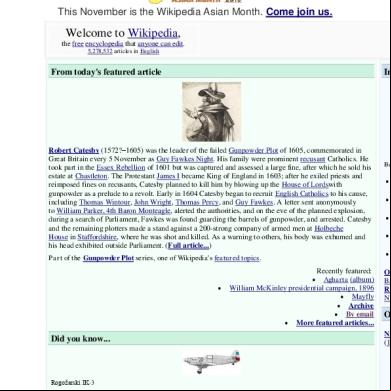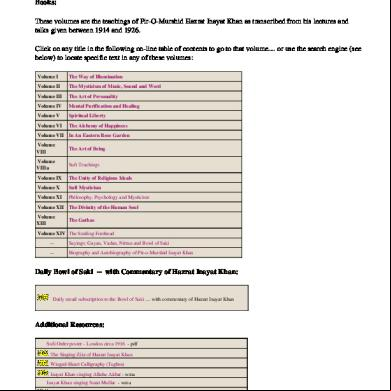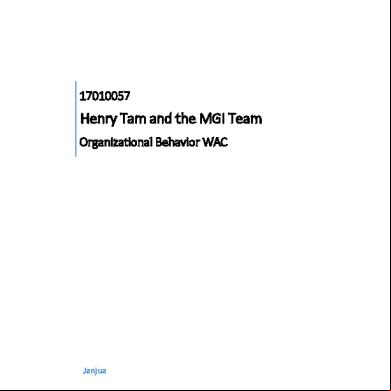Ramadan Is The Ninth Month Of The Muslim Calendar.docx 474f4r
This document was ed by and they confirmed that they have the permission to share it. If you are author or own the copyright of this book, please report to us by using this report form. Report 3b7i
Overview 3e4r5l
& View Ramadan Is The Ninth Month Of The Muslim Calendar.docx as PDF for free.
More details w3441
- Words: 619
- Pages: 2
Ramadan is the ninth month of the Muslim calendar, and it is during this holy month that Muslims are ened by the Qur'an to fast.It is compulsory or wajib, whereby Muslims are required to abstain from satisfying their most basic needs and urges, daily, between sunrise and sunset. This is to instil self-discipline, patience, spirituality, humility and submissiveness to God. Fasting is one of the five tenets of Islam, as is the paying of zakat (alms tax for the poor), which must be tithed by the end of Ramadan.There are several categories of people who are exempted from fasting, namely the sick, the old and menstruating women.The fasting month ends with the festival of Aidilfitri, popularly known as Hari Raya Puasa, or simply Hari Raya (Day of Celebration) in Malaysia.
Malaysia during Ramadan
Fasting is usually observed as a collective experience, particularly among the Malays. Children from as young as seven are trained to fast during Ramadan, beginning with fasting for half a day, so that by the time they reach the age of 12, they can perform their religious obligation much like how an adult would. A typical day for a Malaysian Muslim, during Ramadan, would start before dawn, where families gather to have their pre-dawn meal (sahur) and prepare for the dawn prayer (subuh). Thereafter, they go about their day as they normally would. It is not uncommon to see Muslims preparing food, although they could not partake in it. Many may also be involved in strenuous activities. In other words, fasting is not a time for resting.Muslim adults who are found deliberately defying their religious obligation (such as eating in public during the day) may be apprehended by the authorities, and fined if found guilty.
Out of respect for the holy month, those who are exempted from fasting do not eat in public. Non-Muslims are also very respectful, taking extra care not to do anything that may encroach on Muslim sensitivities.Muslim-owned restaurants and food stalls are usually closed during the day but see brisk business during and after the breaking of fast. It is now common to see temporary bazaars that are set up throughout the country just for the holy month. These so-called Ramadan Bazaars, which open late in the afternoon, resemble the Malaysian pasar malam (night markets) and offer food items, as well as merchandise for the festive season.As the day winds down, many would visit these bazaars to purchase food for the breaking of fast.Many hotels and restaurants also offer Ramadan Specials, usually buffet offerings that are popular among corporate clients.It is to be noted that both the Ramadan bazaars and hotel buffets are not restricted to Muslims alone; it is also popular among non-Muslims in Malaysia. The azan (call to prayer) for Maghrib (evening prayer) signals the time for buka puasa (breaking fast), and having fasted the whole day, a Muslim may once again eat and resume normal activities from this point on, until dawn the next day.After breaking fast, Muslims are encouraged to perform the evening prayer in congregation. In fact, it is common for mosques to organise buka puasa for their congregants. Later in the night, immediately after Isyak (night prayer), Muslims perform the Tarawikh, which means ‘pause’. It is so named because worshippers rest after each pair of salutations.The Tarawikh prayer in Malaysia is rather unique; unlike other congregational prayers, women and children can take part. It is also a unique and common practice in Malaysia for mosques to serve refreshments, usually donated by congregants, after the prayers.
Reference: Prof Dr M. Kamal Hassan & Dr Ghazali bin Basri, “The Pillars of Islam: Zakat and fasting,” The Encyclopedia of Malaysia: Religions and Beliefs, Archipelago Press, 2005, pp. 26, 27
Malaysia during Ramadan
Fasting is usually observed as a collective experience, particularly among the Malays. Children from as young as seven are trained to fast during Ramadan, beginning with fasting for half a day, so that by the time they reach the age of 12, they can perform their religious obligation much like how an adult would. A typical day for a Malaysian Muslim, during Ramadan, would start before dawn, where families gather to have their pre-dawn meal (sahur) and prepare for the dawn prayer (subuh). Thereafter, they go about their day as they normally would. It is not uncommon to see Muslims preparing food, although they could not partake in it. Many may also be involved in strenuous activities. In other words, fasting is not a time for resting.Muslim adults who are found deliberately defying their religious obligation (such as eating in public during the day) may be apprehended by the authorities, and fined if found guilty.
Out of respect for the holy month, those who are exempted from fasting do not eat in public. Non-Muslims are also very respectful, taking extra care not to do anything that may encroach on Muslim sensitivities.Muslim-owned restaurants and food stalls are usually closed during the day but see brisk business during and after the breaking of fast. It is now common to see temporary bazaars that are set up throughout the country just for the holy month. These so-called Ramadan Bazaars, which open late in the afternoon, resemble the Malaysian pasar malam (night markets) and offer food items, as well as merchandise for the festive season.As the day winds down, many would visit these bazaars to purchase food for the breaking of fast.Many hotels and restaurants also offer Ramadan Specials, usually buffet offerings that are popular among corporate clients.It is to be noted that both the Ramadan bazaars and hotel buffets are not restricted to Muslims alone; it is also popular among non-Muslims in Malaysia. The azan (call to prayer) for Maghrib (evening prayer) signals the time for buka puasa (breaking fast), and having fasted the whole day, a Muslim may once again eat and resume normal activities from this point on, until dawn the next day.After breaking fast, Muslims are encouraged to perform the evening prayer in congregation. In fact, it is common for mosques to organise buka puasa for their congregants. Later in the night, immediately after Isyak (night prayer), Muslims perform the Tarawikh, which means ‘pause’. It is so named because worshippers rest after each pair of salutations.The Tarawikh prayer in Malaysia is rather unique; unlike other congregational prayers, women and children can take part. It is also a unique and common practice in Malaysia for mosques to serve refreshments, usually donated by congregants, after the prayers.
Reference: Prof Dr M. Kamal Hassan & Dr Ghazali bin Basri, “The Pillars of Islam: Zakat and fasting,” The Encyclopedia of Malaysia: Religions and Beliefs, Archipelago Press, 2005, pp. 26, 27
